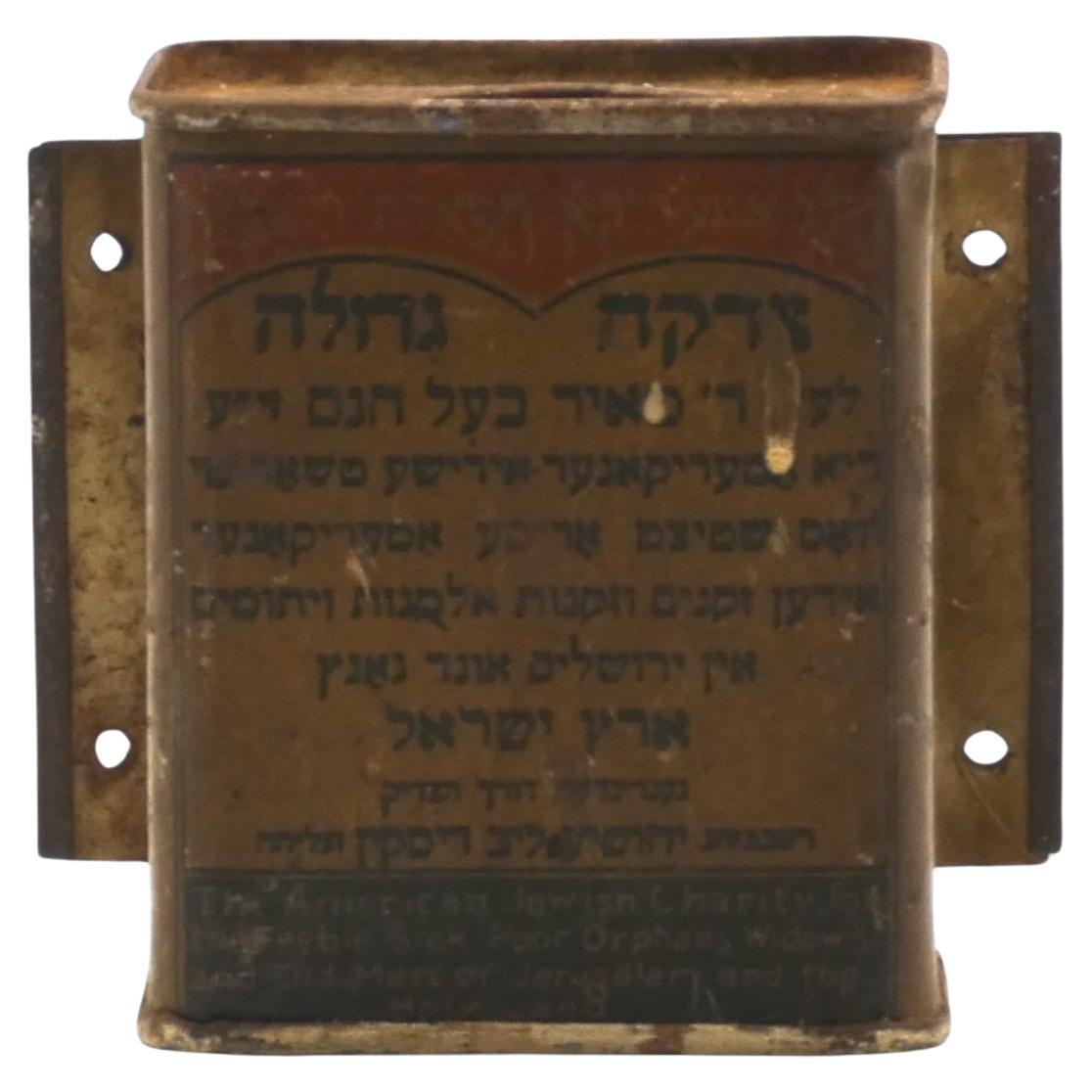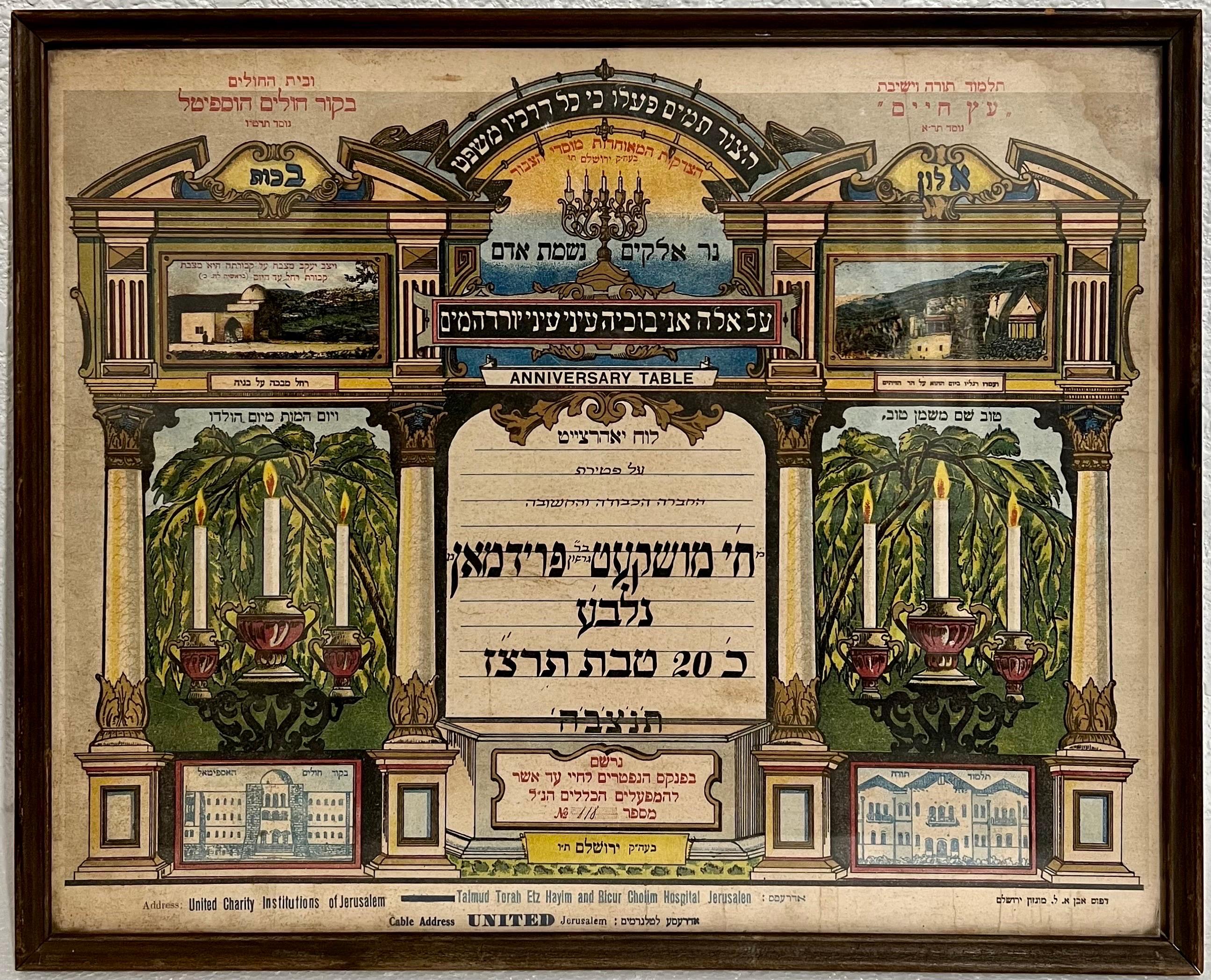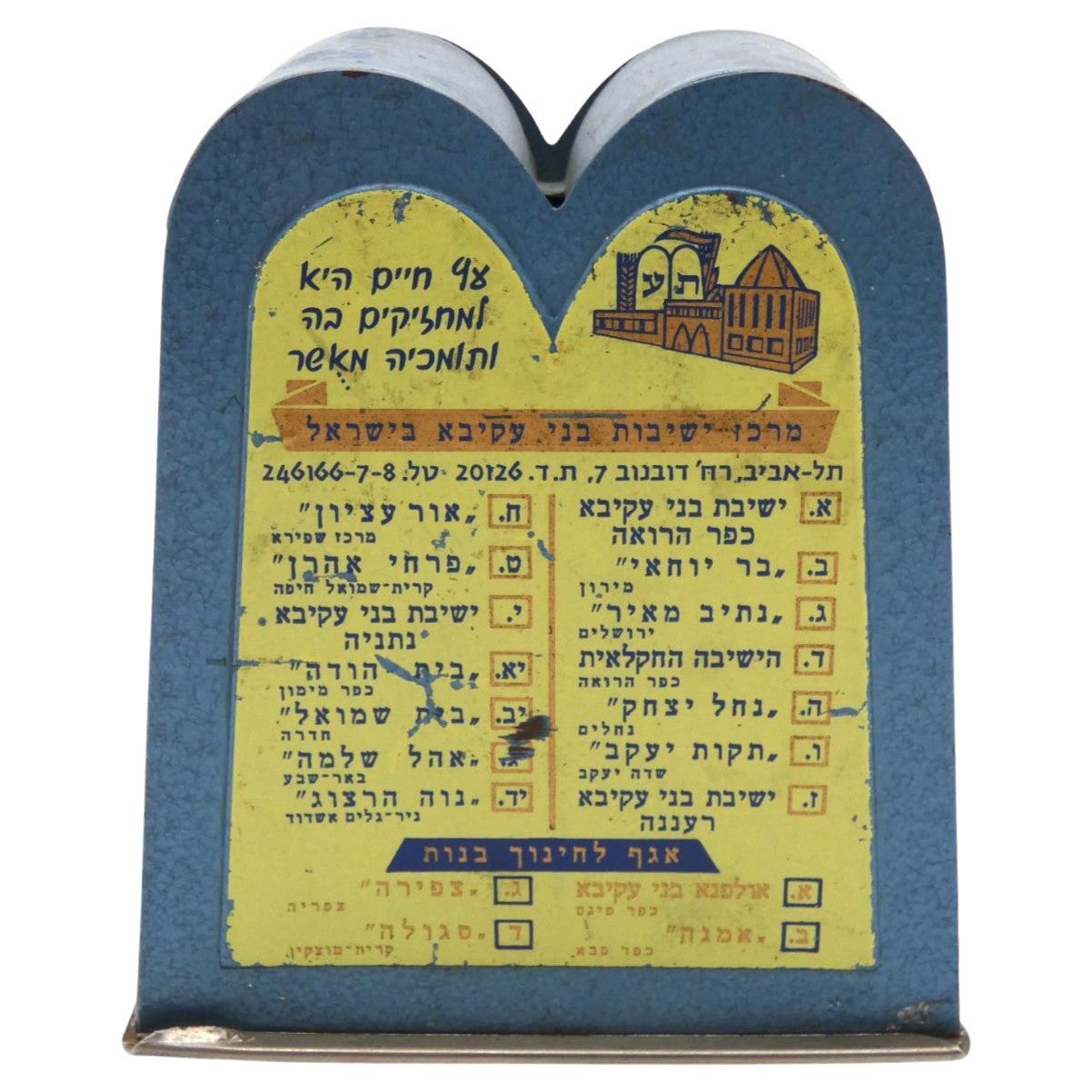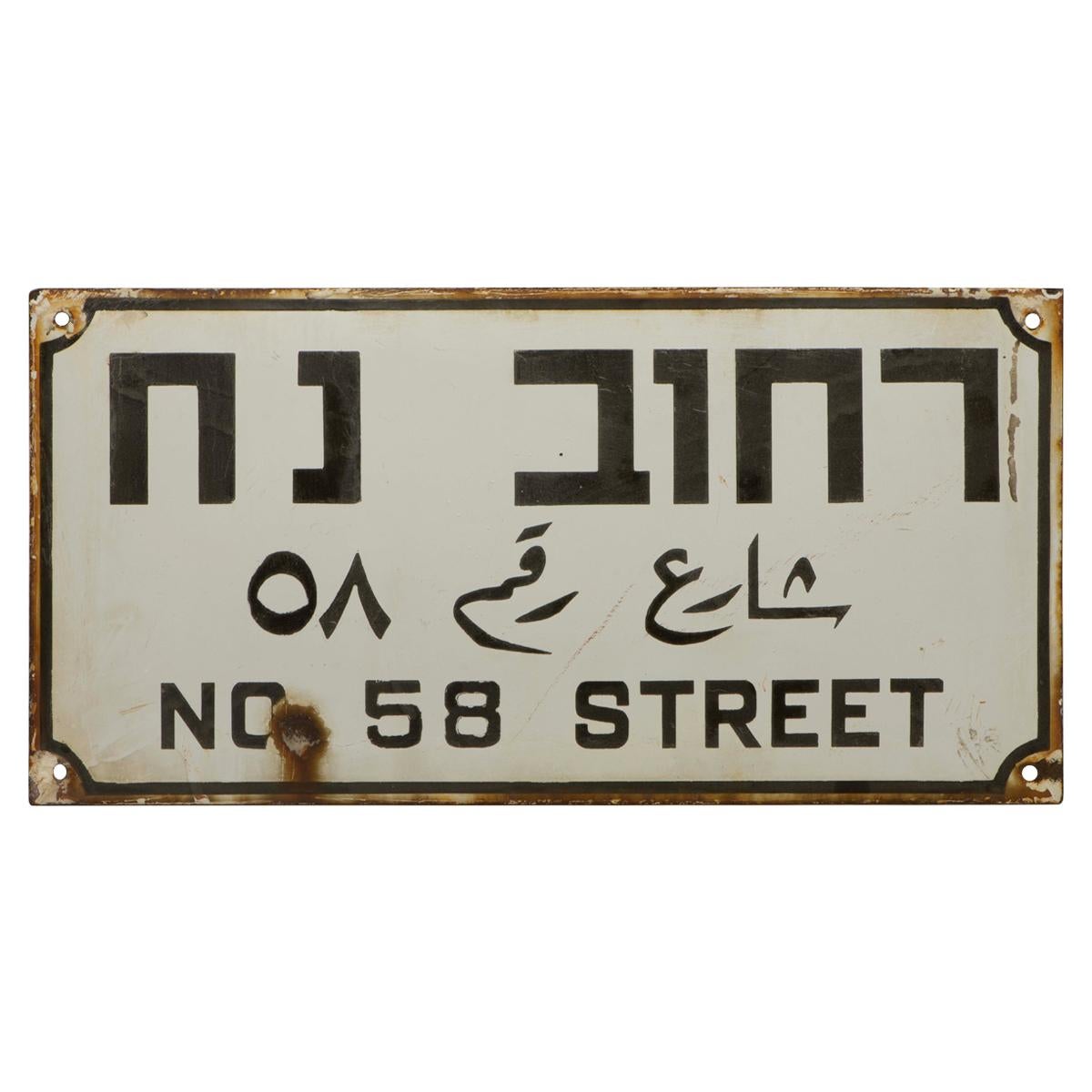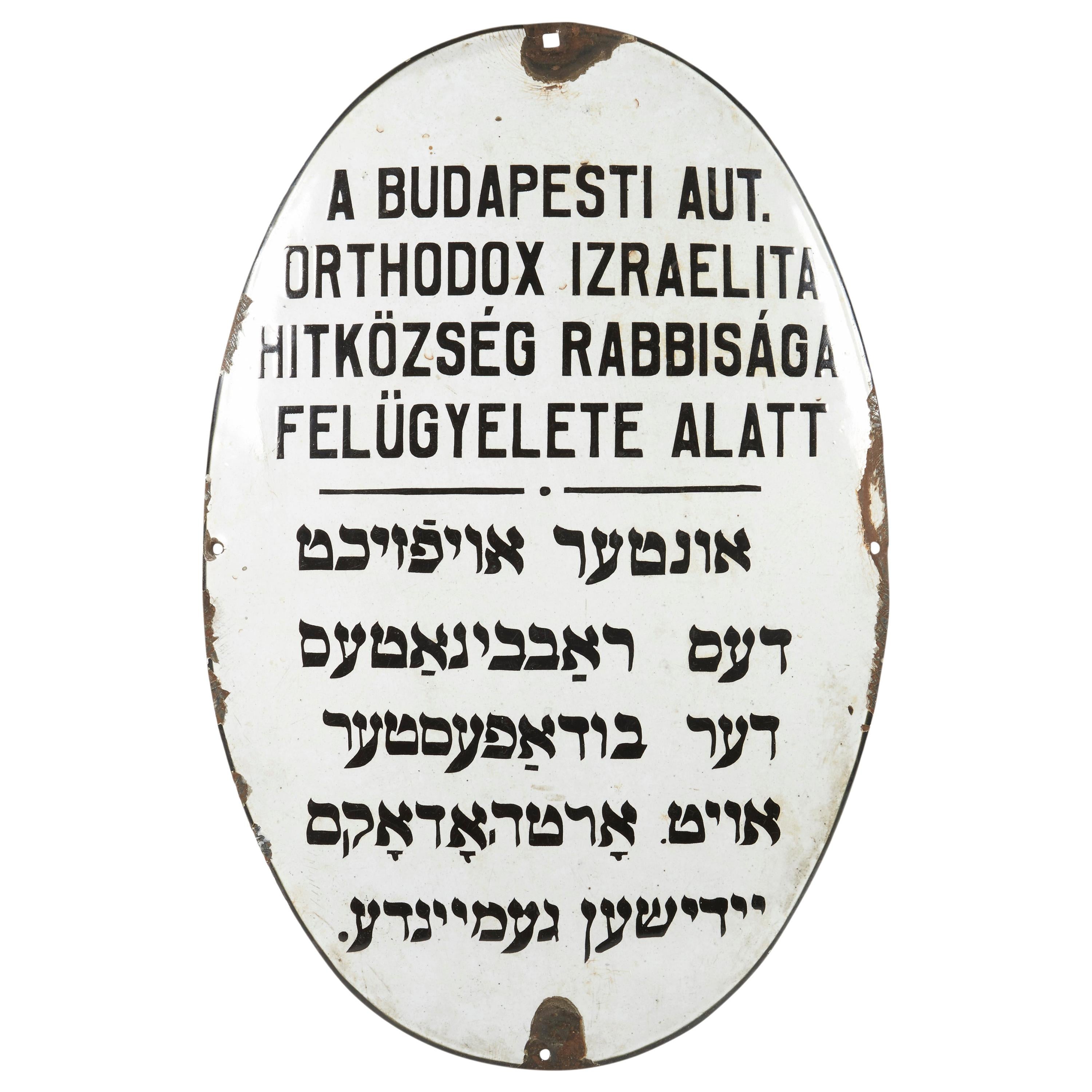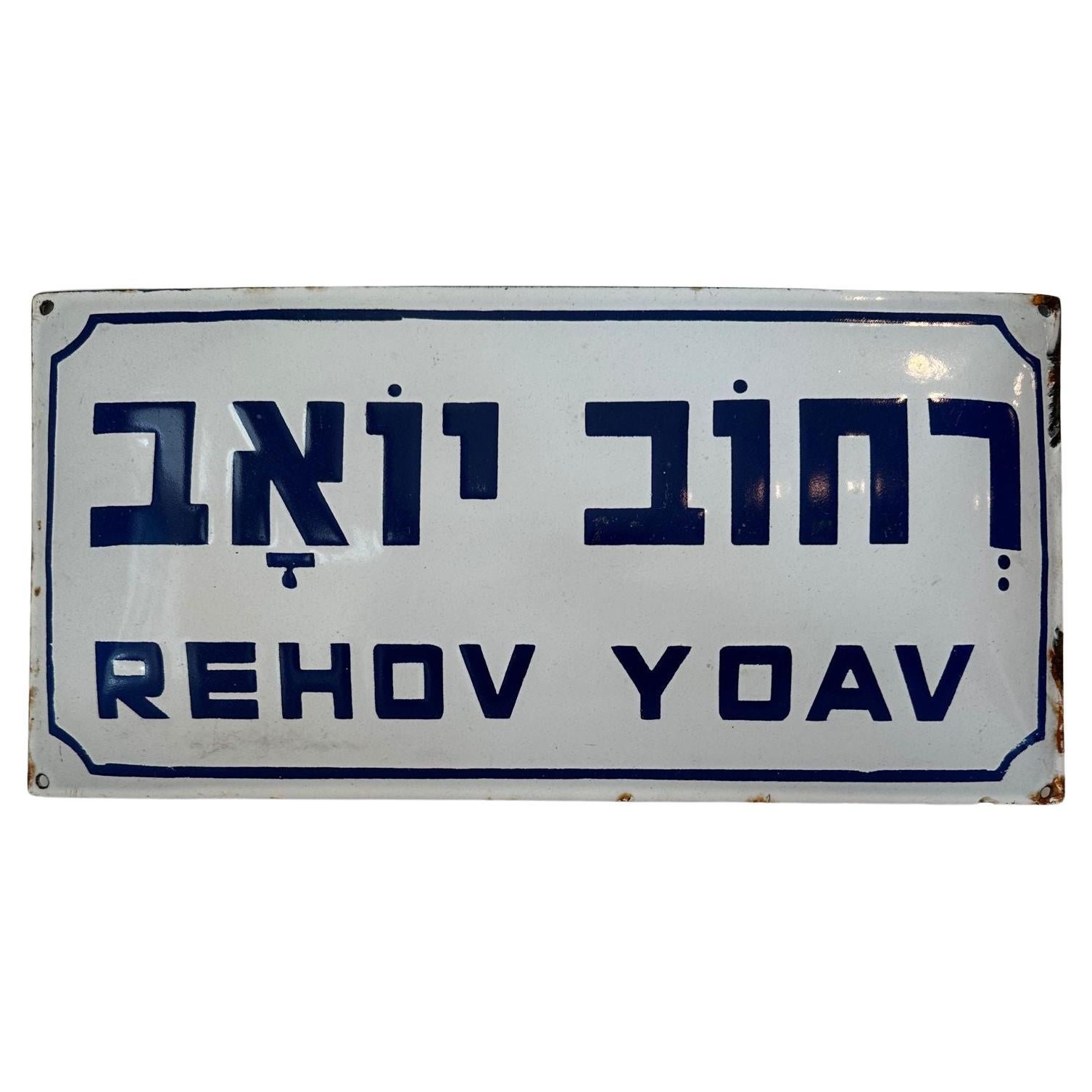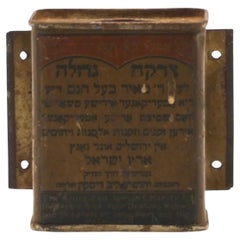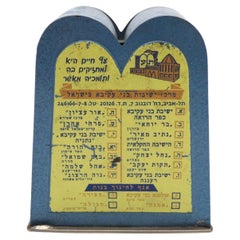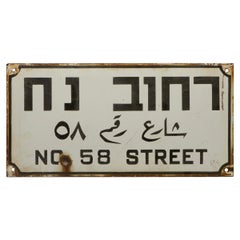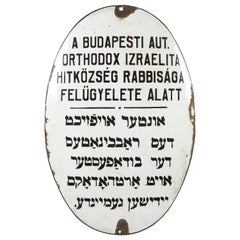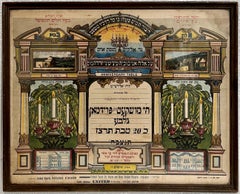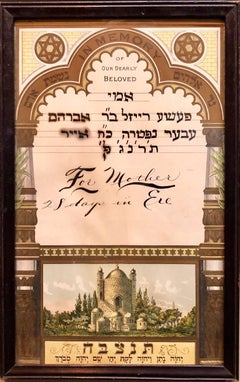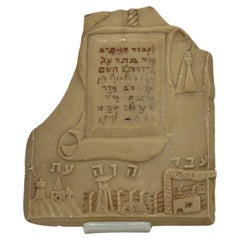Items Similar to An Early 20th Century Sign for Rav Naftali Horowitz , Boro Park, New York
Want more images or videos?
Request additional images or videos from the seller
1 of 5
An Early 20th Century Sign for Rav Naftali Horowitz , Boro Park, New York
$1,200
$1,50020% Off
£904.81
£1,131.0120% Off
€1,042.66
€1,303.3320% Off
CA$1,664.72
CA$2,080.9120% Off
A$1,865.31
A$2,331.6420% Off
CHF 970.97
CHF 1,213.7120% Off
MX$22,819.26
MX$28,524.0720% Off
NOK 12,324.63
NOK 15,405.7920% Off
SEK 11,640.47
SEK 14,550.5920% Off
DKK 7,783.69
DKK 9,729.6120% Off
Shipping
Retrieving quote...The 1stDibs Promise:
Authenticity Guarantee,
Money-Back Guarantee,
24-Hour Cancellation
About the Item
An early 20th-century sign for Rav Naftali Horowitz in Boro Park, New York for the diverse Jewish population who emigrated to New York in that period.
Painted in green, black, and off-white with Rav Naftali Horowitz's name Prominently displayed in both English and Hebrew at the center. His telephone number is painted at the top and his address on 52nd Street in Boro Park, New York is displayed at the bottom.
The sign is made of hard-pressed wood and was hung in public areas like a shul or town meeting places. The sign provided the Jewish people of that area with the Rabbi's contact information via telephone (though phone use was not as widespread) and His address for those who wished to consult the Rabbi on public or private matters.
- Dimensions:Height: 11.82 in (30 cm)Width: 11.89 in (30.2 cm)Depth: 0.28 in (7 mm)
- Materials and Techniques:
- Place of Origin:
- Period:
- Date of Manufacture:20th century
- Condition:Wear consistent with age and use.
- Seller Location:New York, NY
- Reference Number:1stDibs: LU5281240317312
About the Seller
5.0
Recognized Seller
These prestigious sellers are industry leaders and represent the highest echelon for item quality and design.
Established in 2006
1stDibs seller since 2020
130 sales on 1stDibs
Typical response time: Several days
- ShippingRetrieving quote...Shipping from: Pomona, NY
- Return Policy
Authenticity Guarantee
In the unlikely event there’s an issue with an item’s authenticity, contact us within 1 year for a full refund. DetailsMoney-Back Guarantee
If your item is not as described, is damaged in transit, or does not arrive, contact us within 7 days for a full refund. Details24-Hour Cancellation
You have a 24-hour grace period in which to reconsider your purchase, with no questions asked.Vetted Professional Sellers
Our world-class sellers must adhere to strict standards for service and quality, maintaining the integrity of our listings.Price-Match Guarantee
If you find that a seller listed the same item for a lower price elsewhere, we’ll match it.Trusted Global Delivery
Our best-in-class carrier network provides specialized shipping options worldwide, including custom delivery.More From This Seller
View AllA Kollel America Charity Container, New York Circa 1930
Located in New York, NY
A Kollel America Tiferet Jerusalem Charity Container from New York circa 1930 is tied to the charitable activities of Jewish immigrant communities in America raising donations for ca...
Category
Early 20th Century American Religious Items
Materials
Tin
$720 Sale Price
20% Off
A Charity Container for the Bnei Akiva Organization , Israel 1950
Located in New York, NY
A charity container for the Bnei Akiva organization in Israel from around 1950 reflects the ethos and activities of this prominent religious Zionist youth movement.
Bnei Akiva is a ...
Category
Vintage 1950s Israeli Religious Items
Materials
Metal
$1,120 Sale Price
20% Off
Early 20th Century Israeli Iron and Enamel Street Sign
Located in New York, NY
Three languages iron and enamel street sign, circa 1920.
The sign was made for 58 street in the city of Haifa. The three languages indicate the sig...
Category
Vintage 1920s Decorative Art
Materials
Iron, Enamel
$936 Sale Price
20% Off
Early 20th Century Hungarian Enamel Kosher Butcher Shop Sign
Located in New York, NY
Heavy and massive enamel Kosher butcher shop sign, Budapest, Hungary, circa 1900.
White and black enamel over iron, inscribed in Hebrew and in Hungar...
Category
Early 20th Century Hungarian Architectural Elements
Materials
Enamel, Iron
$6,338 Sale Price
34% Off
Mid-20th Century Enamel and Iron Israeli 'Yoav' Street Name Sign
Located in New York, NY
Mid-20th century handmade Israeli street name sign. Made of enamel and iron, this street sign was created shortly after the establishment of the state o...
Category
Vintage 1940s Israeli Mid-Century Modern Decorative Art
Materials
Enamel, Iron
$1,440 Sale Price
20% Off
A Rabbi Meir Ba'al Haness Charity Container, Israel Circa 1920
Located in New York, NY
A Rabbi Meir Ba'al Haness charity container from Israel circa 1920 is an artifact associated with Jewish religious devotion and charitable traditions.
Rabbi Meir Ba'al Haness, also ...
Category
Vintage 1920s Israeli Religious Items
Materials
Tin
$1,440 Sale Price
20% Off
You May Also Like
Rare Palestine Antique Hebrew Judaica Yahrzeit Synagogue Sign Memorial Plaque
Located in Surfside, FL
Circa 1890-1920. This Neoclassical, Judaic, Egyptian revival, Orientalist Mizrach sign, was produced in British Mandate Palestine by the chromolithograph process at the beginning of the 20th century. It pictures vignettes of holy places. with a hand written memorial. It was for the Tzedakah charity fund for the century-old institutions in Jerusalem: The great "Torah Center Etz Chaim"; a Free Kitchen for poor children and orphans; the famous Bikur Cholim Hospital with its dispensaries and clinics and the only Home for Incurable Invalids in Eretz Israel. They also worked with Arthur Szyk and Alfred Salzmann.. The A.L. Monsohn Lithographic Press (Monzon Press, Monson Press, דפוס אבן א"ל מאנזאהן, דפוס מונזון) was established in Jerusalem in 1892 by Abraham-Leib (or Avrom-Leyb) Monsohn II (Jerusalem, c.1871-1930) and his brother Moshe-Mordechai (Meyshe-Mordkhe). Sponsored by members of the Hamburger family, the brothers had been sent to Frankfurt, Germany in 1890 to study lithography. Upon returning to Jerusalem in 1892 with a hand press, they established the A.L. Monsohn Lithographic Press in the Old City of Jerusalem. According to the Information Center for Israeli Art A.L. Monsohn "created complex decorations for documents and oriental calendars that combined the tradition of Jewish art with modern printing techniques such as photographic lithography, raised printing and gilding."
The founders of the Monsohn press produced Jewish-themed color postcards, greeting cards, Jewish National Fund stamps, and maps documenting the evolution of the Jewish settlement in Eretz Israel in the nineteenth-twentieth centuries; religious material such as decorative plaques for synagogues, portraits of Old Yishuv rabbis such as Shmuel Salant, Mizrah posters indicating the direction of prayer for synagogues, memorial posters, and posters for Sukkot booths; color frontispieces for books such as Pentateuch volumes and the early song collections of Abraham Zvi Idelsohn (e.g., Shire Zion, Jerusalem 1908); artistic wedding invitations; and labels, packaging and advertisements for the pioneering entrepreneurs of Eretz Israel. The texts appearing in the Monsohn products were in several languages: Hebrew, Arabic, Yiddish, English, German (e.g., a c1920 trilingual Hebrew-English-Arabic "Malaria Danger" broadside warning the public of mosquitoes spreading malaria). Many of the brilliantly colored postcards and maps can be seen online as can the artistic invitations to his children's weddings which Monsohn published in the Jerusalem Hebrew press.
For years, the Monsohn (later, Monson/Monzon) Press was considered the best and most innovative in the country—pioneering in such techniques as gold-embossing and offset printing, among others. Early items for tourists included collections of Flowers of the Holy Land (c. 1910–1918)—pressed local flowers accompanied by scenes from the Eretz Israel countryside and relevant verses from the Bible, edited by Jsac Chagise (or Itzhak Haggis), an immigrant from Vitebsk, and bound in carved olive wood boards. Shortly after World War I Monsohn (now spelled מונזון) used zincography to produce the prints included in the Hebrew Gannenu educational booklets for young children illustrated by Ze'ev Raban of the Bezalel Academy of Art and Design and printed in Jerusalem by Hayim Refael Hakohen (vol. 1, 1919; vols. 2–3, 1920). In 1934 Monsohn moved into the new, western part of Jerusalem, in a shop with four presses and 30 workers, including Abraham-Leib's sons, David, Yosef, Moshe and Shimon, and his daughter Raytse's husband, Abraham Barmacz. The concern did business with all sectors of the city's population, including Arabs, for whom they printed in Arabic. Among their clients were members of the Ginio, Havilio, and Elite families, and Shemen, Dubek, and other renowned national brands, manufacturing products such as wine, candies, oil, and cigarettes. They also printed movie and travel posters, and government posters, postcards and documents, hotel luggage labels...
Category
Early 20th Century Aesthetic Movement More Art
Materials
Lithograph
Rare Judaica 1893 Jewish Yizkor Memorial Plaque Hebrew English Chromolithograph
Located in Surfside, FL
A rare Judaic memorial piece for mother.
Category
Late 19th Century Aesthetic Movement More Prints
Materials
Lithograph
Historic Rare Carved memorial plaque made by Jewish internee in Cyprus, 1948
Located in Tel Aviv - Jaffa, IL
super rare and historic example of Cyprus stone carving, made by jewish holocaust surviver that was Detained at the Internment camps in Cyprus, just 3 years after the holocaust. this piece is very unusual, most of this carvings shows us aspects of living in the Refugee camps or zionist views of israel, sometimes they even made judaica objects like menorahs Or Candlesticks, but its rare to find memorial plaques such as the example in front of us, the plaques was Damaged In the way to israel and two pieces from the upper section were broken off, the middle part of the Plaque shows a Scroll shaped memorial plaque with the inscription : "for the dead who died on the name of god" In red color, the middle has a yellow star carved and painted, just like the yellow star jewish...
Category
Vintage 1940s Cypriot Antiquities
Materials
Soapstone
Antique Embroidery with Hebrew Inscriptions
Located in London, GB
Antique embroidery with Hebrew inscriptions
Continental, late 19th century
Measures: Height 91cm, width 87cm
The wall hanging is crafted from...
Category
Antique Late 19th Century European Tapestries
Materials
Textile
Typeface, Hebrew Font and Numbers Enamel Judaica Art Plaque
By George F Welch
Located in Surfside, FL
Dimensions w/Frame: 10" x 7 1/2" x 1 1/2"
A George F. Welch Abstract Copper Enamel Wall Art Plaque Inscribed signature on the lower right of the plaqu...
Category
20th Century Modern Mixed Media
Materials
Enamel
rare Silver picture frame, Bezalel School Jerusalem, Zeev Raban, Israel, Jewish
Located in Tel Aviv - Jaffa, IL
This is an important and super rare picture frame, all hand made from silver, by the way the work was done and by the design it was hand made by Zeev Raban, in the last picture you c...
Category
20th Century Israeli Jugendstil Picture Frames
Materials
Silver
More Ways To Browse
Boro Boro
Antique Wood Telephones
Contact Telephone Number
Antique Boro
Wood Cash Register
Antebellum Furniture
Antique Chaps
Antique Glass Christmas Ornaments
Antique Railway Memorabilia
Civil War Cannon
George Washington Plaque
Nyc Memorabilia
13 Star American Flags
Vintage Air Force Memorabilia
Antique Coal Mining
Antique Fire Hose
Antique Masonic Collectables
Marshall Plan
